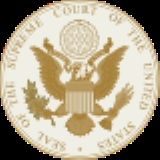
United States v. Eichman
Encyclopedia
United States v. Eichman, 496 U.S. 310
(1990) was a United States Supreme Court
case that invalidated a federal law against flag desecration
as violative of free speech under the First Amendment
to the Constitution
. It was argued together with the case United States v. Haggerty.
When Republicans retook control of Congress for the 104th session
, the Flag Desecration Amendment
was first proposed, which would grant the federal government the authority to proscribe flag burning. A resolution for this Amendment passed the House in every session from the 104th until the 109th Congress, but never got past the Senate (in the most recent vote, passage in the Senate failed by one vote), and has not been considered since the 109th Congress.
Case citation
Case citation is the system used in many countries to identify the decisions in past court cases, either in special series of books called reporters or law reports, or in a 'neutral' form which will identify a decision wherever it was reported...
(1990) was a United States Supreme Court
Supreme Court of the United States
The Supreme Court of the United States is the highest court in the United States. It has ultimate appellate jurisdiction over all state and federal courts, and original jurisdiction over a small range of cases...
case that invalidated a federal law against flag desecration
Flag desecration
Flag desecration is a term applied to various acts that intentionally destroy, damage or mutilate a flag in public, most often a national flag. Often, such action is intended to make a political point against a country or its policies...
as violative of free speech under the First Amendment
First Amendment to the United States Constitution
The First Amendment to the United States Constitution is part of the Bill of Rights. The amendment prohibits the making of any law respecting an establishment of religion, impeding the free exercise of religion, abridging the freedom of speech, infringing on the freedom of the press, interfering...
to the Constitution
United States Constitution
The Constitution of the United States is the supreme law of the United States of America. It is the framework for the organization of the United States government and for the relationship of the federal government with the states, citizens, and all people within the United States.The first three...
. It was argued together with the case United States v. Haggerty.
Subsequent actions
On remand, the Eichman case was dismissed, as those defendants had only been charged with flag desecration. However, the Haggerty case had an additional charge of destruction of government property, as the burned flag was alleged to have been stolen from Seattle's Capitol Hill Post Office. To that charge, all four Seattle defendants pled guilty and were fined. Garza and Strong (who had prior convictions) served 3 days in jail each.When Republicans retook control of Congress for the 104th session
104th United States Congress
The One Hundred Fourth United States Congress was a meeting of the legislative branch of the United States federal government, composed of the United States Senate and the United States House of Representatives. It met in Washington, DC from January 3, 1995 to January 3, 1997, during the third and...
, the Flag Desecration Amendment
Flag Desecration Amendment
The Flag Desecration Amendment, often referred to as the flag burning amendment, is a controversial proposed constitutional amendment to the United States Constitution that would allow the United States Congress to statutorily prohibit expression of political views through the physical desecration...
was first proposed, which would grant the federal government the authority to proscribe flag burning. A resolution for this Amendment passed the House in every session from the 104th until the 109th Congress, but never got past the Senate (in the most recent vote, passage in the Senate failed by one vote), and has not been considered since the 109th Congress.
See also
- Flag desecrationFlag desecrationFlag desecration is a term applied to various acts that intentionally destroy, damage or mutilate a flag in public, most often a national flag. Often, such action is intended to make a political point against a country or its policies...
- Street v. New YorkStreet v. New YorkIn Street v. New York, 394 U.S. 576 , the United States Supreme Court held that a New York state law making it a crime "publicly [to] mutilate, deface, defile, or defy, trample upon, or cast contempt upon either by words or act [any flag of the United States]" was, in part, unconstitutional because...
- Texas v. JohnsonTexas v. JohnsonTexas v. Johnson, , was an important decision by the Supreme Court of the United States that invalidated prohibitions on desecrating the American flag enforced in 48 of the 50 states. Justice William Brennan wrote for a five-justice majority in holding that the defendant's act of flag burning was...
- Flag Protection ActFlag Protection ActReacting to protests during the Vietnam War era, the United States 90th Congress enacted Public Law 90-381 , later codified as 18 U.S.C. 700, et. seq., and better known as the Flag Protection Act of 1968. It was an expansion to nationwide applicability of a 1947 law previously restricted only to...
- Flag Desecration AmendmentFlag Desecration AmendmentThe Flag Desecration Amendment, often referred to as the flag burning amendment, is a controversial proposed constitutional amendment to the United States Constitution that would allow the United States Congress to statutorily prohibit expression of political views through the physical desecration...
- Street v. New York
External links
- US vs. Eichman audio recording of oral argument, May 14, 1990
- First Amendment Library entry on Eichman v. United States
- Street v. New York
- Texas v. Johnson

